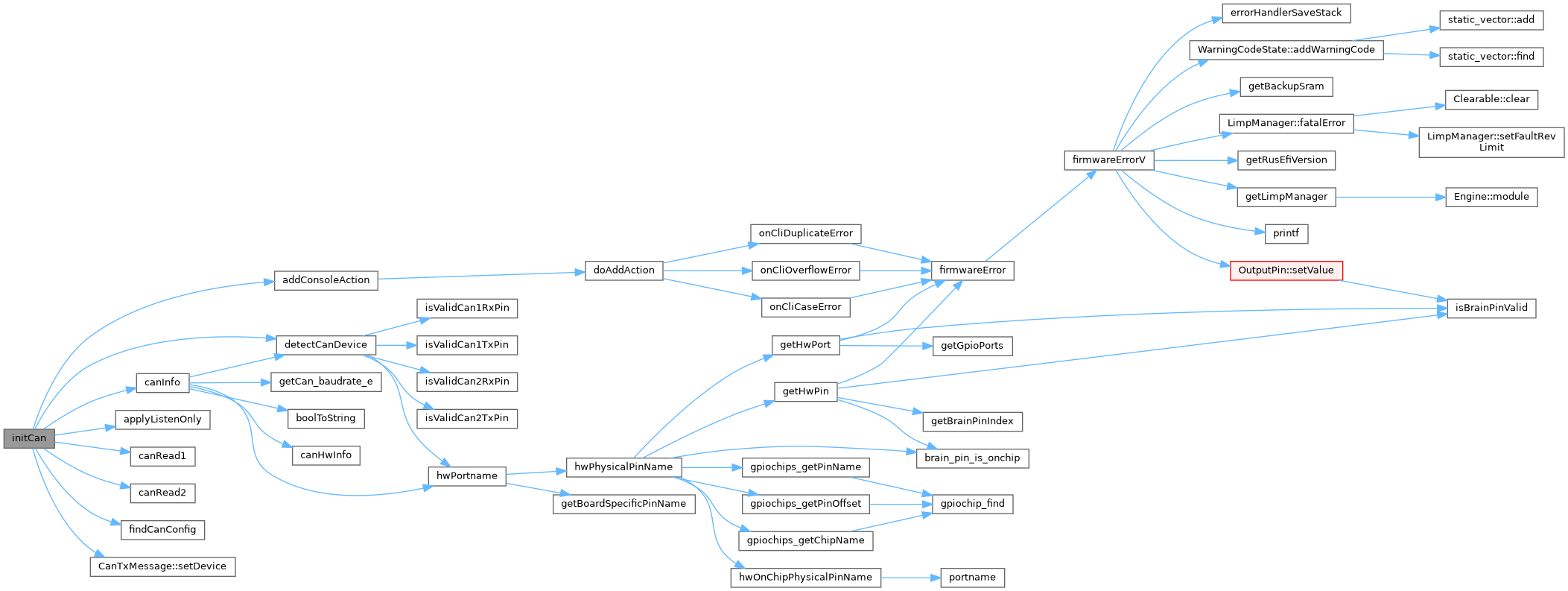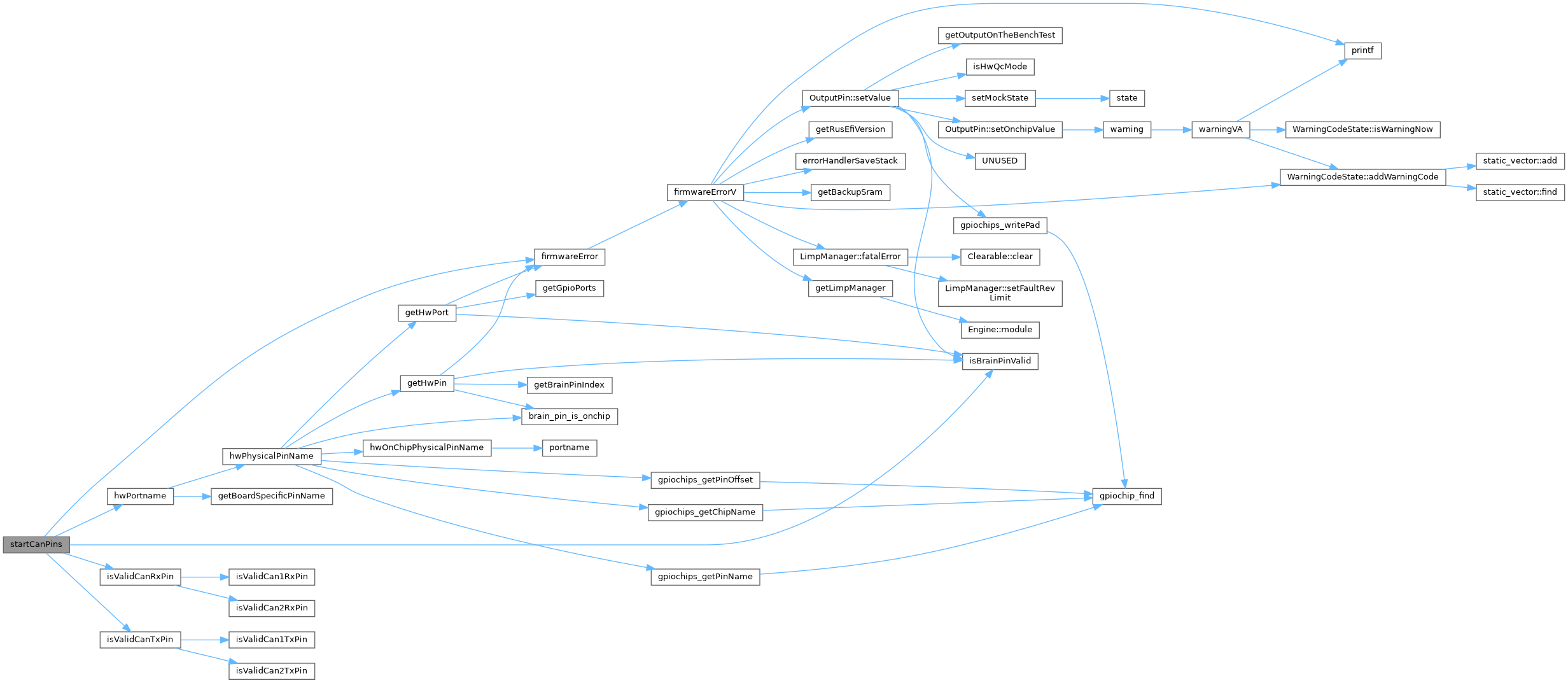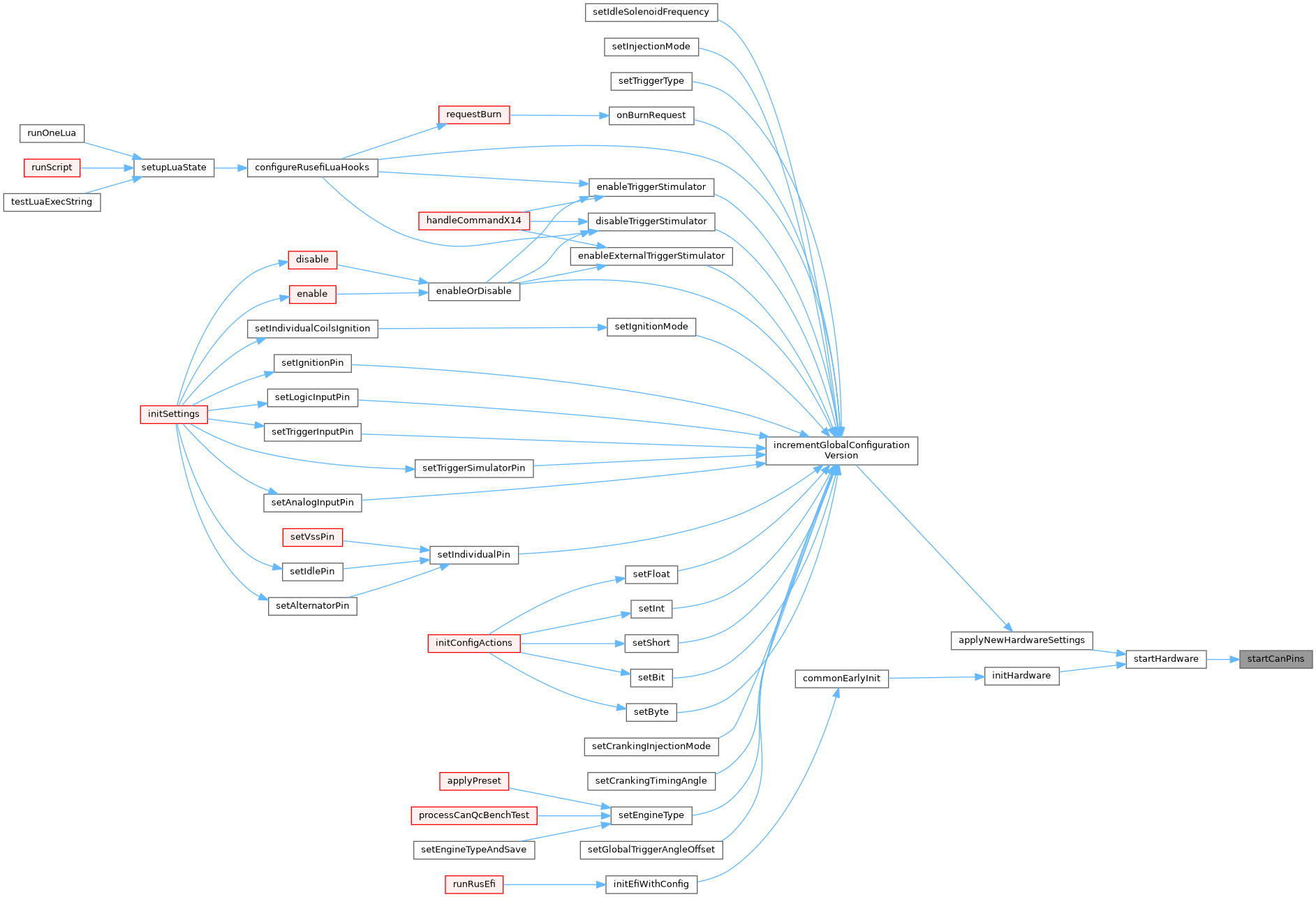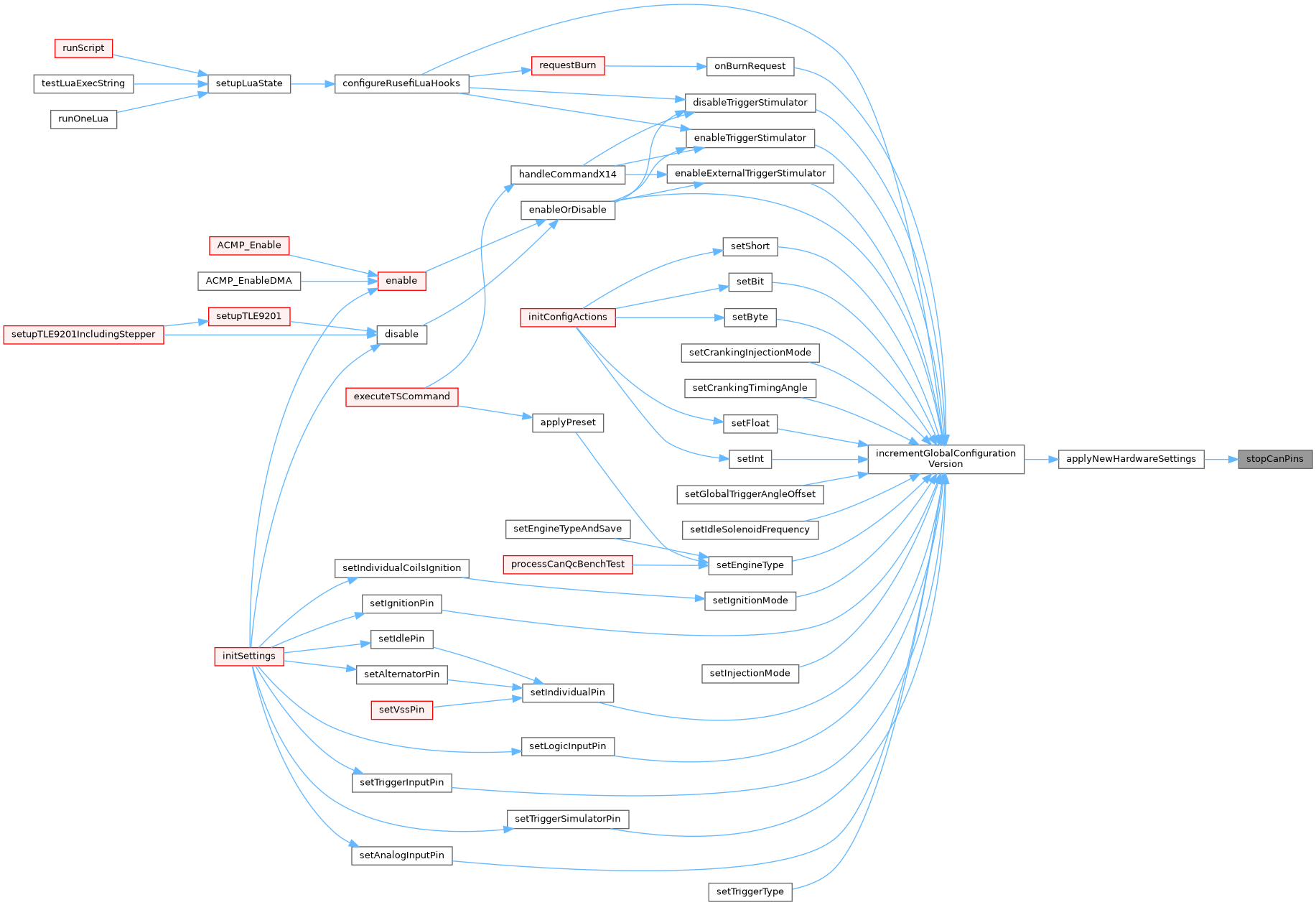Detailed Description
- Date
- Dec 11, 2013
Definition in file can_hw.h.
Functions | |
| void | initCan () |
| void | setCanType (int type) |
| void | setCanVss (int type) |
| void | stopCanPins () |
| void | startCanPins () |
| bool | getIsCanEnabled (void) |
Function Documentation
◆ getIsCanEnabled()
| bool getIsCanEnabled | ( | void | ) |
Definition at line 298 of file can_hw.cpp.
◆ initCan()
| void initCan | ( | ) |
Definition at line 210 of file can_hw.cpp.
210 {
212
214
215 // No CAN features enabled, nothing more to do.
217 return;
218 }
219
220 // Determine physical CAN peripherals based on selected pins
223#if (EFI_CAN_BUS_COUNT >= 3)
225#endif
226
227 // If all devices are null, a firmware error was already thrown by detectCanDevice, but we shouldn't continue
228 if (!device1 && !device2) {
229#if (EFI_CAN_BUS_COUNT >= 3)
230 if (!device3)
231#endif
232 return;
233 }
234
235 // Devices can't be the same!
236 if (((device1 == device2) && device1) ||
237#if (EFI_CAN_BUS_COUNT >= 3)
238 ((device2 == device3) && device2) ||
239 ((device3 == device1) && device3) ||
240#endif
241 0) {
242 criticalError("CAN pins must be set to different devices");
243 return;
244 }
245
246 // Initialize peripherals
247 if (device1) {
248 // Config based on baud rate
249 // Pointer to this local canConfig is stored inside CANDriver
250 // even it is used only during canStart this is wierd
251 CANConfig canConfig;
254 canStart(device1, &canConfig);
255
256 // Plumb CAN devices to tx system
257 CanTxMessage::setDevice(0, device1);
258 }
259
260 if (device2) {
261 CANConfig canConfig;
264 canStart(device2, &canConfig);
265
266 // Plumb CAN devices to tx system
267 CanTxMessage::setDevice(1, device2);
268 }
269
270#if (EFI_CAN_BUS_COUNT >= 3)
271 if (device3) {
272 CANConfig canConfig;
275 canStart(device3, &canConfig);
276
277 // Plumb CAN devices to tx system
278 CanTxMessage::setDevice(2, device3);
279 }
280#endif
281
282 // fire up threads, as necessary
284 canWrite.start();
285 }
286
288 canRead1.start(device1);
289 canRead2.start(device2);
290#if (EFI_CAN_BUS_COUNT >= 3)
291 canRead3.start(device3);
292#endif
293 }
294
296}
static void applyListenOnly(CANConfig *canConfig, bool isListenOnly)
Definition can_hw.cpp:196
static CCM_OPTIONAL CanRead canRead1(0)
static CCM_OPTIONAL CanRead canRead3(2)
static CCM_OPTIONAL CanRead canRead2(1)
static void setDevice(size_t idx, CANDriver *device)
Definition can_msg_tx.cpp:31
void addConsoleAction(const char *token, Void callback)
Register console action without parameters.
Definition cli_registry.cpp:91
static constexpr engine_configuration_s * engineConfiguration
Definition engine_configuration.h:80
can_baudrate_e canBaudRate
bool can3ListenMode
can_baudrate_e can2BaudRate
bool can1ListenMode
bool canWriteEnabled
bool can2ListenMode
bool canReadEnabled
can_baudrate_e can3BaudRate
Referenced by initHardware().
Here is the call graph for this function:

Here is the caller graph for this function:

◆ setCanType()
| void setCanType | ( | int | type | ) |
Definition at line 139 of file can_hw.cpp.
Here is the call graph for this function:

◆ setCanVss()
| void setCanVss | ( | int | type | ) |
Definition at line 221 of file can_vss.cpp.
221 {
223}
can_vss_nbc_e canVssNbcType
◆ startCanPins()
| void startCanPins | ( | ) |
Definition at line 156 of file can_hw.cpp.
156 {
157 // nothing to do if we aren't enabled...
159 return;
160 }
161
162 // Validate pins
165 // todo: smarter online change of settings, kill isCanEnabled with fire
166 return;
167 }
168 firmwareError(ObdCode::CUSTOM_OBD_70, "invalid CAN TX %s", hwPortname(engineConfiguration->canTxPin));
169 return;
170 }
171
174 // todo: smarter online change of settings, kill isCanEnabled with fire
175 return;
176 }
177 firmwareError(ObdCode::CUSTOM_OBD_70, "invalid CAN RX %s", hwPortname(engineConfiguration->canRxPin));
178 return;
179 }
180
181#if EFI_PROD_CODE
182 efiSetPadModeIfConfigurationChanged("CAN TX", canTxPin, PAL_MODE_ALTERNATE(EFI_CAN_TX_AF));
183 efiSetPadModeIfConfigurationChanged("CAN RX", canRxPin, PAL_MODE_ALTERNATE(EFI_CAN_RX_AF));
184
185 efiSetPadModeIfConfigurationChanged("CAN2 TX", can2TxPin, PAL_MODE_ALTERNATE(EFI_CAN_TX_AF));
186 efiSetPadModeIfConfigurationChanged("CAN2 RX", can2RxPin, PAL_MODE_ALTERNATE(EFI_CAN_RX_AF));
187
188#if (EFI_CAN_BUS_COUNT >= 3)
189 efiSetPadModeIfConfigurationChanged("CAN3 TX", can3TxPin, PAL_MODE_ALTERNATE(EFI_CAN3_TX_AF));
190 efiSetPadModeIfConfigurationChanged("CAN3 RX", can3RxPin, PAL_MODE_ALTERNATE(EFI_CAN3_RX_AF));
191#endif // EFI_CAN_BUS_COUNT >= 3
192#endif // EFI_PROD_CODE
193}
@ CUSTOM_OBD_70
Gpio canRxPin
Gpio canTxPin
Referenced by startHardware().
Here is the call graph for this function:

Here is the caller graph for this function:

◆ stopCanPins()
| void stopCanPins | ( | ) |
Definition at line 144 of file can_hw.cpp.
144 {
145 efiSetPadUnusedIfConfigurationChanged(canTxPin);
146 efiSetPadUnusedIfConfigurationChanged(canRxPin);
147 efiSetPadUnusedIfConfigurationChanged(can2TxPin);
148 efiSetPadUnusedIfConfigurationChanged(can2RxPin);
149#if (EFI_CAN_BUS_COUNT >= 3)
150 efiSetPadUnusedIfConfigurationChanged(can3TxPin);
151 efiSetPadUnusedIfConfigurationChanged(can3RxPin);
152#endif
153}
Referenced by applyNewHardwareSettings().
Here is the caller graph for this function:
